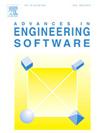基于序列机器学习的脆性分析:反应堆安全壳受内压的序列 ML-FA
IF 4
2区 工程技术
Q2 COMPUTER SCIENCE, INTERDISCIPLINARY APPLICATIONS
引用次数: 0
摘要
随着核电站引入概率安全评估,脆性分析对于评估结构失效的概率至关重要。然而,由于需要明确考虑和量化所有不确定性来源,这种脆性分析需要进行大量的有限元分析。本研究旨在提出一种基于顺序加工学习的框架,该框架可以顺序高效地估算核电站安全壳的脆性,同时最大限度地减少有限元分析。在该框架内,机器学习模型被用于根据从有限元分析中收集到的分析数据预测安全壳的行为。预测数据用于在拟议框架内通过最大似然估计估计脆性曲线,用于训练机器学习模型的分析数据数量依次增加,直到达到估计脆性曲线所需的收敛指数。此外,还将从拟议框架中获得的最终脆性曲线与从 1000 个分析数据中获得的脆性曲线(基准)进行比较。通过使用最少的有限元分析来估算脆性曲线,该拟议框架可大大降低计算成本。本文章由计算机程序翻译,如有差异,请以英文原文为准。
Sequential machine learning based fragility analysis: Sequential ML-FA for reactor containment vessel subjected to internal pressure
With the introduction of probabilistic safety assessment in nuclear power plants, a fragility analysis is critical to evaluating the probability of a failure of structures. However, such fragility analysis requires a large amount of finite element analyses due to explicit consideration and quantification of all sources of uncertainty. This study aims to present a sequential machining learning-based framework that can sequentially and efficiently estimate the fragility of containment vessels in nuclear power plants while minimizing finite element analyses, and the proposed framework is applied for performing a fragility analysis of a prestressed concrete containment vessel subjected to internal pressure. Within the framework, machine learning models are used to predict the behavior of the containment vessel based on collected analytical data from finite element analyses. The predicted data are used to estimate fragility curves through maximum likelihood estimation within the proposed framework, and the number of analytical data for training machine learning models is sequentially increased until the required convergence index of the estimated fragility curve is reached. In addition, the final fragility curves obtained from the proposed framework are compared with the fragility curves (benchmark) obtained from 1000 analytical data. This proposed framework can significantly reduce computational costs by estimating the fragility curve with the minimum number of finite element analyses.
求助全文
通过发布文献求助,成功后即可免费获取论文全文。
去求助
来源期刊

Advances in Engineering Software
工程技术-计算机:跨学科应用
CiteScore
7.70
自引率
4.20%
发文量
169
审稿时长
37 days
期刊介绍:
The objective of this journal is to communicate recent and projected advances in computer-based engineering techniques. The fields covered include mechanical, aerospace, civil and environmental engineering, with an emphasis on research and development leading to practical problem-solving.
The scope of the journal includes:
• Innovative computational strategies and numerical algorithms for large-scale engineering problems
• Analysis and simulation techniques and systems
• Model and mesh generation
• Control of the accuracy, stability and efficiency of computational process
• Exploitation of new computing environments (eg distributed hetergeneous and collaborative computing)
• Advanced visualization techniques, virtual environments and prototyping
• Applications of AI, knowledge-based systems, computational intelligence, including fuzzy logic, neural networks and evolutionary computations
• Application of object-oriented technology to engineering problems
• Intelligent human computer interfaces
• Design automation, multidisciplinary design and optimization
• CAD, CAE and integrated process and product development systems
• Quality and reliability.
 求助内容:
求助内容: 应助结果提醒方式:
应助结果提醒方式:


